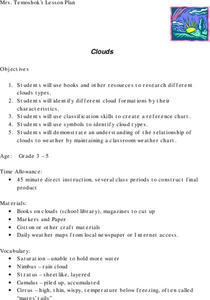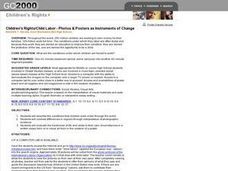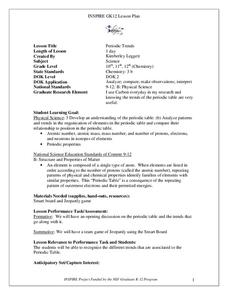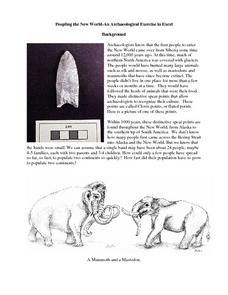Curated OER
Stage 1: What is Going into the Bin?
Student can explain the difference between biodegradable and non-biodegradable. They calculate how much rubbish bags all their families together produce each week and then calculate how much rubbish their families produce during the...
Curated OER
Savings and Stocks
Work together to brainstorm answers to different questions related to the savings of American people. Draw a bar graph representing stocks. Practice using new economic terms as well.
Curated OER
Classroom Recycling Center
Students create, organize and advertise a recycling center in their classroom. Students brainstorm different items that could be recycled, including cell phones and printer cartridges. Various recycling stations are set up in the...
Curated OER
Classroom Recycling Center
Students create, organize and advertise a recycling center in their classroom. Students brainstorm different items that could be recycled, including cell phones and printer cartridges. Various recycling stations are set up in the...
Curated OER
Lesson Three: The History of Christmas Trees, Part Three
Learners explore the influence of different beliefs and customs on seasonal celebrations by recognizing their historic development. They develop an awareness that traditions and customs are influenced by different environments.
Curated OER
New Year Celebrations
Young scholars study the universality of many New Year celebrations. They present traditions associated with New Year celebrations and explain why New Year is at different times for different people.
Curated OER
living in our family
Students compare a day in the life of a young person in one Asian country (India, Indonesia, Philippines, Thailand, or Vietnam) with a day in their own lives. The focus of this unit of work is on families, and students are required to...
Curated OER
Where Do We Get the Money We Spend?
Students discuss the sources of income for people in their community. They examine why different jobs are paid different wages. They also classify productive resources in the economy.
Curated OER
Using Authentic Texts to Teach Vocabulary
Students read an article identifying any new vocabulary words they are unfamiliar with. Using the text, they discover antonyms, synonyms and word families. They answer comprehension questions and review the vocabulary to end the lesson.
Curated OER
Family Responsibility
Students compare their roles and responsibilities at home with those of the adults in their home. They make a poster showing how the members of their families work together.
Curated OER
Clouds
Students explore the characteristics of clouds, their formation, symbols used in their identification, and the relationship of clouds to weather. The lesson focuses on how they are formed and their classification.
Curated OER
Children's Rights/Child Labor - Photos & Posters as Instruments of Change
Middle schoolers research the use of students for labor around the globe. Using magazine pictures, they create a poster showing the various conditions they are subject to. They compare and contrast the differences in regions and...
Curated OER
Children's Rights/Child Labor -- A Photographic Essay
Students continue to examine the conditions students work in throughout the world. Using photographs, they discover the similarities and differences in regions throughout the world. They relate their own experiences to the child laborers.
Curated OER
Marty and Me
Pupils read 'Marty and Me' by Phyllis Reynolds Naylor. They compare their lives with Marty's life, which in most cases, is very different. They find similarities and differences and create a montage. They include information about their...
Curated OER
Groups We Belong To
Pupils think about and identify different kinds of groups. They see that people are born into certain groups and that they join others. They explore the circumstances that surround group affiliation and participation.
Curated OER
Where to shop?
Students study a topic of an environmental nature that is relevant to them (as individuals) on a local level, but with global implications. They consider whether their family's shopping habits have any lasting effects on the environment.
Curated OER
My Crayons Talk Activity Card
In this language arts worksheet, students cut out 6 pictures and paste them on a chart of crayon colors to respond to a book called My Crayons Talk. Students paste the pictures of objects that the author Patricia Hubbard associates with...
Curated OER
Place as a Mirror of Self and community
Eighth graders study difference and community by exploring a special place in their lives. In this Geography lesson, 8th graders discover a geographic place of importance to them and their family. Students summarize what many...
Curated OER
Periodic Trends
Students identify the different periodic trends. In this chemistry lesson, students discuss how elements are arranged in the periodic table. They apply what they have learned in a Jeopardy team game.
Curated OER
The English Settle America
Sixth graders compare immigration today with that of the colonial period. They locate colonies on a map and describe reasons their families immigrated to the United States.
Curated OER
Living Longer
Students view a short video about diseases that are most common today and what ones were common fifty years ago. They examine demographic trends in developing and industrialized countries. They research life expectancy, birth rate and...
Curated OER
The Letter B
Students are introduced on how to write a cursive letter b. As a class, they answer where the loop closes in the letter b and how b differs from other letters. They complete a worksheet in which they trace a row of letters and practice...
Curated OER
Paint Plus
Using the computer and the Paint program, Students explore the different tools available in the paint program, and then create a picture showing two sets of pictures and an equation.
Curated OER
Peopling the New World -- An Archaeological Exercise in Excel
Students examine different types of spears that have been discovered from various civilizations. In groups, they calculate the answers to various word problems and enter their information on a spreadsheet. They use the data in other...























